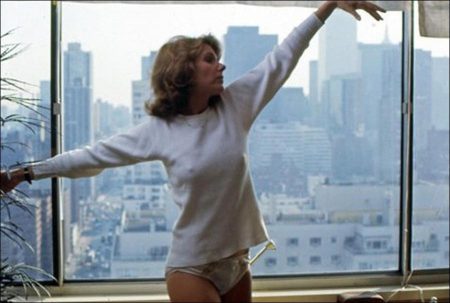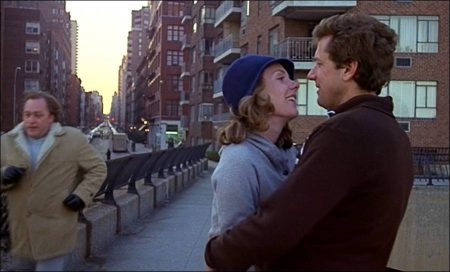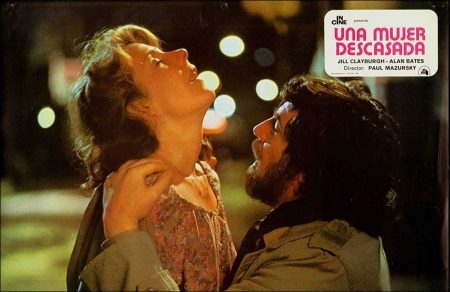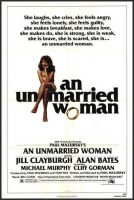An Unmarried Woman movie storyline. Erica (Jill Clayburgh) is unmarried only temporarily, in that her successful, wealthy husband of seventeen years has just left her for a girl he met while buying a shirt in Bloomingdale’s. This movie shows Erica coming to terms with the break-up, while revising her opinions of herself, redefining that self in its own right rather than as an extension of somebody else’s personality, and finally going out with another man.
Erica refuses to drop everything for Saul, an abstract expressionist painter, simply out of love for him, because he expects her to. It is not so much loneliness that is her problem, and the problems that men, flitting around this newly “available” woman like moths round a flame, bring to her sense of independence.
An Unmarried Woman is a 1978 American comedy-drama film written and directed by Paul Mazursky and starring Jill Clayburgh, Alan Bates, Michael Murphy, Cliff Gorman, Patricia Quinn, Kelly Bishop, Linda Miller, Lisa Lucas, Andrew Duncan, Penelope Russianoff, Matthew Arkin and Novella Nelson. The film was nominated for the Academy Award for Best Picture and Clayburgh was nominated for an Academy Award for Best Actress.
Film Review for An Unmarried Woman
What would you do if, after 15 years of what has seemed to be a happy marriage, you’re walking down the street with your husband, making plans to rent a house on Fire Island for the summer, when he stops, looks suddenly bereft, and breaks into the sobs of childhood as he says he wants out? He confesses that he has another woman, another life he wants to go to, and he feels so miserable about everything he’s shocked when you don’t sympathize.
In Paul Mazursky’s new comedy, “An Unmarried Woman,” about America’s dangerously mobile, just-this-side-of-rootless middle class, Erica (Jill Clayburgh) gets bloody mad. She stalks off alone down the street, throws up in a trash basket and, when she at last lets the news sink in, starts to cry in fury, surprise, hurt and fear.As Miss Clayburgh plays this scene, one has a vision of all the immutable things that can be destroyed in less than a minute, from landscapes and ships and reputations to perfect marriages.
The scene is beautifully written by Mr. Mazursky. It is high comedy of a sharp, bitter kind, and Michael Murphy is fine as the weasel husband named Martin, but Miss Clayburgh is nothing less than extraordinary in what is the performance of the year to date. In her we see intelligence battling feeling—reason backed against the wall by pushy needs.In the succeeding weeks, Erica begins to cope. Daily routine helps. She has her job in a SoHo art gallery. She has her teen-age daughter and her women friends, some of whom are in worse shape than she is. One night she gets out of bed and systematically throws out Martin’s shaving gear, golf clubs and Adidas sneakers.
For a while Erica also has a woman therapist who makes her feel better by appearing serenely understanding (and a tiny bit smug) as she repeats to Erica truisms that can be very comforting to the deeply distressed.”An Unmarried Woman,” which opens today at the Beekman, Paramount and Murray Hill Theaters, is Mr. Mazursky’s most ambitious movie so far, and the first film to put Miss Clayburgh’s talents to full use. She was charming in “Semi-Tough,” but otherwise she’s had to wade around in things such as “The Silver Streak” and “Gable and Lombard,” pretending that mud puddles are swimming pools.
Mr. Mazursky has written a marvelous role for the actress, so I suppose it’s not unfair of him to depend on her to carry the movie, which is ultimately not as tough and funny and critical as it is in individual moments. Because Mr. Mazursky has such a sharp eye for the essential props of a certain kind of American life, and because he has an ear for the way people talk, one expects him to be a more merciless social satirist than he has any intention of being.
In his best films, “Blume in Love” and “Harry and Tonto,” as in the supposedly elegiacal “Next Stop Greenwich Village,” he inevitably chooses the sentimental over the satiric, which one could defend as his right if he weren’t so effective in portraying the essential foolishness of a plastic society. It’s as if he couldn’t restrain his affection for people and thing that, as he shows them to us, aren’t worth it. Specific scenes in “An Unmarried Woman” come across in sharp focus, but the overall view is as soft and fuzzy as something photographed through gauze.
This is especially apparent in the new film after he has introduced us to Erica and her “problem,” and after we witness her first desperate, comic attempts to liberate herself sexually (with an egocentric Village painter, nicely played by Cliff Gorman). Erica doesn’t flounder for long. She meets Mr. Right in the form of an English artist (Alan Bates), who’s so manly, wise, affectionate and dependable that he seems to be out of “The Sleeping Beauty.
“The final quarter of the movie gives the impression not of having been written, directed and acted, but of a tone poem that’s been scored with slushv music and paced with swoony camera shots, thus to suggest an alternate title, “An Unmarried Man and A Woman.
“The way the film evolves should not be a complete surprise, I suppose, because in the earlier sequences one is always aware of the sort of romantic method by which scenes must begin with images as seen through mirrors, a device that is even more boring than the freeze-frame, which he also uses.Mr. Mazursky is a writer-director of such real abilities that we’ve the right to demand that he be better. He’s fine with his actors (though Mr. Bates’s role is no challenge to an exceptional actor) and he has the potential of a great satirst. It’s as if he were afraid to let himself go because he wouldn’t please enough people. He attempts to soothe when he should scratch.
An Unmarried Woman (1978)
Directed by: Paul Mazursky
Starring: Jill Clayburgh, Alan Bates, Michael Murphy, Cliff Gorman, Patricia Quinn, Kelly Bishop, Linda Miller, Lisa Lucas, Andrew Duncan, Penelope Russianoff, Matthew Arkin, Novella Nelson
Screenplay by: Paul Mazursky
Production Design by: Pato Guzman
Cinematography by: Arthur J. Ornitz
Film Editing by: Stuart H. Pappé
Costume Design by: Albert Wolsky
Set Decoration by: Edward Stewart
Music by: Bill Conti
Distributed by: 20th Century Fox
Release Date: March 5, 1978
Views: 197



